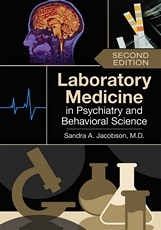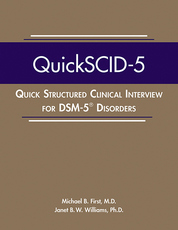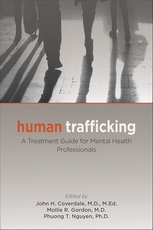Approach to the Psychiatric Patient, Second Edition
Case-Based Essays
View Pricing
Description
A fascinating text that addresses the clinical and educational challenges of treating psychiatric patients from a truly multidisciplinary perspective using a case-based format, Approach to the Psychiatric Patient: Case-Based Essays is the only book of its kind and an indispensable addition to the mental health practitioner's library. The new edition builds upon the strengths that distinguished the first, with composite cases that are carefully constructed to capture real-world problems, followed by essays that provide clear and cogent perspectives on the case. These essays cover a wide range, from the more conventional (such as differential diagnosis of anxiety or the clinical characteristics of delirium) to the unusual and intriguing (such as creativity and mental illness or an analysis of the case in relation to the classic, Strange Case of Dr. Jekyll and Mr. Hyde). Every chapter has been revised, and the book boasts many new co-contributors, as well as the addition of completely new essays. For example, in the chapter on geriatric depression, several new essays have been added on the topics of collaborative care and the embedded psychiatrist, depression and medical illness, and biomarkers to identify depression subtypes, while the chapter on terminal illness features new essays on spirituality and meaning-centered therapy. In addition, there are new essays on co-occurring anxiety and alcohol use disorders, medication assisted treatment for stimulant use, treatment of body dysmorphic disorder, and more.
The text possesses many useful attributes for the reader:
- The more than 100 essays were written by a broad range of specialists, each with particular expertise in their aspect of the case, and the resulting commentary is focused and concise.
- In addition to the case and discussions, each chapter offers an overview and summary points designed to facilitate further consideration of the patient and clinical situation and to focus on the key points.
- The book's unique structure enhances its flexibility, allowing the reader to read a case and accompanying essays straight through, or to pick and choose as the need or whim arises.
- The cases' clinical settings are diverse, ranging from inpatient hospitalizations and emergency room evaluations to outpatient assessments and long-term psychotherapies, maximizing relevance and resonance.
- Each essay has its own bibliography, which provides both rigorous documentation and additional sources for more exploration of the topic.
Approach to the Psychiatric Patient: Case-Based Essays distinguishes itself from prior texts in both the richness of its cases and the ingenuity of its format, and its multidisciplinary wisdom and insight will be appreciated by a wide range of readers.
Contents
- Contributors
- Preface
- How to Use This Book
- Chapter 1. Double Depression and James Avery
- Chapter 2. Geriatric Depression and Peter Burke
- Chapter 3. Mood Instability and Amy Cahill
- Chapter 4. Schizophrenia and Anthony Da Piazza
- Chapter 5. Terminal Illness and Dorothy Ewing
- Chapter 6. Agitation and Stephen Franken
- Chapter 7. Adolescent Bereavement and Amelia Gutierrez
- Chapter 8. Anxiety and Sophia Hastings
- Chapter 9. Hypomania and Jennifer Ingram
- Chapter 10. Exam Failure and Grace Jin
- Bibliography
- Subject Index
- Index of Cases by Diagnostic Concepts
Contributors
- George S. Alexopoulos, M.D.
Margaret Altemus, M.D.
Donna T. Anthony, M.D.
Paul S. Appelbaum, M.D.
Evelyn Attia, M.D.
Elizabeth L. Auchincloss, M.D.
Jonathan Avery, M.D.
Hilary J. Beattie, Ph.D.
William Breitbart, M.D.
Beth S. Brodsky, Ph.D.
Benjamin Brody
Richard P. Brown, M.D.
Fredric N. Busch, M.D.
Martha Bruce, Ph.D., M.P.H.
Ian A. Canino, M.D.
Deborah L. Cabaniss, M.D.
John F. Clarkin, Ph.D.
Francine Cournos, M.D.
Janis L. Cutler, M.D.
Katherine Dalsimer, Ph.D.
Lisa Dixon, M.D.
Carolyn J. Douglas, M.D.
Marc Dubin, M.D., Ph.D.
Jane Epstein, M.D.
Aaron Esman, M.D.
Susan Evans, Ph.D.
Brian A. Fallon, M.D., M.P.H.
Stephen J. Ferrando, M.D.
Joseph J. Fins, M.D.
Peter J. Free, M.D.
Zachary Freyberg, M.D.
Elena Friedman, M.D.
Richard A. Friedman, M.D.
Mindy Thompson Fullilove, M.D.
Cathryn A. Galanter, M.D.
David W. Galarneau, M.D.
Patricia L. Gerbarg, M.D.
Andrew J. Gerber, M.D., Ph.D.
Lilya Gershengoren, M.D.
Roberto Gil, M.D.
Charles Glatt, Ph.D.
Scott J. Goldsmith, M.D.
Janna S. Gordon-Elliott, M.D.
Michael F. Grunebaum, M.D.
William A. Frosch, M.D.
Jeffrey K. Halpern, M.D.
David Hellerstein, M.D.
Daniel G. Herrera, M.D., Ph.D.
Margaret E. Hertzig, M.D.
Robert M.A. Hirschfeld, M.D.
Kim Hopper, Ph.D.
Reena Jaiswal, M.D.
David Kahn, M.D.
Gurmeet S. Kanwal
Kevin V. Kelly, M.D.
Otto F. Kernberg, M.D.
Robert Kertzner, M.D.
Jihye Kim, M.D.
David W. Kissane, M.D.
Sibel Klimstra, M.D.
James H. Kocsis, M.D.
Nathan Kravis, M.D.
Francis Lee, M.D.
Phillip Lee, M.D.
Steven P. Levine, M.D.
Mark F. Lenzenweger, Ph.D.
Frances R. Levin, M.D.
Petros Levounis, M.D., M.A.
Conor Liston, M.D.
Catherine Lord, Ph.D.
George J. Makari, M.D.
J. John Mann, M.D.
Eric R. Marcus, M.D.
John C. Markowitz, M.D.
Peter M. Marzuk, M.D.
Mary Jane Massie, M.D.
Melissa Masterson
Marlin R. A. Mattson, M.D.
P. Anne McBride, M.D.
Bruce S. McEwen, Ph.D.
Robert Michels, M.D.
Barbara L. Milrod, M.D.
Justin Mohatt, M.D.
Sharon Alspector Mozian, M.D.
Philip R. Muskin, M.D.
Rebecca Nejat, M.D.
Cloe Nims, M.D.
Ilana Nossel, M.D.
Sharone Ornstein, M.D.
Laszlo A. Papp, M.D.
Sandra Park, M.D.
Steven D. Passik, Ph.D.
Lauren Pepa, Ph.D
Cynthia R. Pfeffer, M.D.
Dionne R. Powell, M.D.
Bruce Phariss, M.D.
Katharine A. Phillips, M.D.
James L. Rebeta, Ph.D.
Diane Rudolph, M.D.
Adam Savitz, M.D.
David W. Schab, M.D.
Daniel S. Schechter, M.D.
Matisyahu Shulman, M.D.
Peter A. Shapiro, M.D.
Theodore Shapiro, M.D.
Matthew Shear, M.D.
Charles H. Silberstein, M.D.
David Silbersweig, M.D.
Smit S. Sinha, M.D.
Franklin Schneier, M.D.
Barbara H. Stanley, Ph.D.
Jennifer Cooper Stelwagon, M.D.
Ayame Takahashi, M.D.
Michael Terman, Ph.D.
Helen Blair Simpson, M.D., Ph.D.
Christy Thompson, Ph.D.
Susan C. Vaughan, M.D.
Milton Viederman, M.D.
Daniel Weisholtz, M.D.
Erica Willheim, Ph.D.
Frank Yeomans, M.D.
Robert C. Young, M.D.
Erin Zerbo, M.D.
About the Authors
John W. Barnhill, M.D., is Professor of Clinical Psychiatry and Professor of Medical Ethics in Clinical Medicine, DeWitt Wallace Senior Scholar, and Vice Chair for Consultation-Liaison Psychiatry at New York-Presbyterian Hospital/Weill Cornell Medicine.
Related Products
Carousel Control - items will scroll by tabbing through them, otherwise arrows can be used to scroll one item at a time








